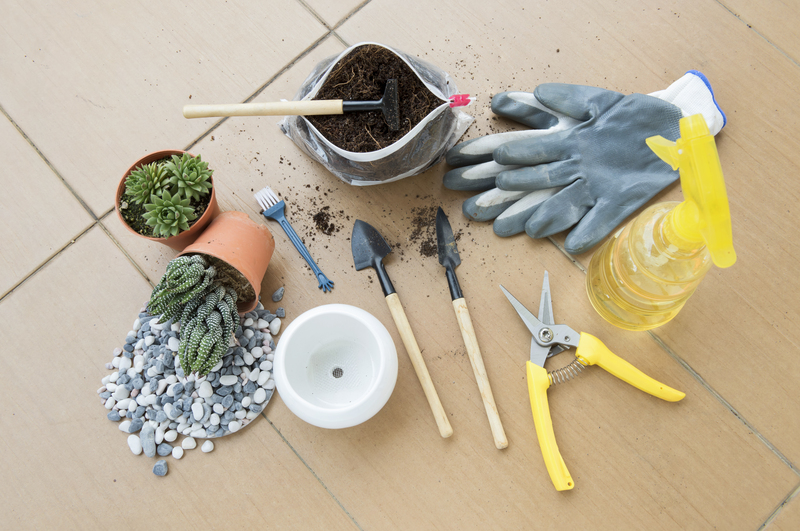Unleash Nature's Best: 3 Tips for Weed Control
Posted on 07/09/2025
Unleash Nature's Best: 3 Tips for Weed Control
Weed management can feel like a never-ending battle for home gardeners and landscapers alike. Not only do weeds steal essential nutrients from your cherished plants, but they can also ruin your garden's aesthetic. Fortunately, natural weed control methods provide safe, sustainable, and effective alternatives to harsh chemicals. Ready to discover nature's most trusted secrets for maintaining a healthy, weed-free garden? Let's dive into three powerful tips for weed control that will help you transform your outdoor spaces--without harming the environment.
Why Natural Weed Control Methods Matter
Before exploring the top weed management strategies, let's briefly discuss why it's important to choose natural solutions:
- Environmental Protection: Eco-friendly methods reduce the risk of groundwater contamination caused by synthetic herbicides.
- Soil Health: Organic techniques preserve essential soil microorganisms, promoting better plant growth.
- Wildlife Safety: Using non-toxic measures protects pollinators like bees and butterflies, which are vital for ecosystem balance.
- Family & Pet Friendly: Chemical-free options are safer for kids and pets who may play outdoors.
These factors make natural weed control strategies not only safe for your garden but also for the planet and your loved ones. Now, let's move into the heart of this article: the best methods to unleash nature's best for weed control.

Tip #1: Mulching--Nature's Blanket Against Weeds
Mulching is one of the oldest and most reliable techniques for naturally suppressing unwanted plants. By covering the soil with a protective layer, mulch blocks light and prevents weed seeds from germinating.
How Mulch Works for Weed Suppression:
- Keeps sunlight from reaching weed seeds.
- Retains soil moisture, reducing the need for frequent watering--and limiting weed growth that thrives in disturbed soil.
- Improves soil quality as it breaks down, adding organic matter and nutrients.
Types of Mulch to Consider
- Organic Mulches: Bark chips, compost, straw, leaf mold, and wood shavings are popular choices for flower beds, vegetable gardens, and landscaping.
- Inorganic Mulches: Gravel, pebbles, or landscape fabric are ideal for pathways and driveways.
How to Apply Mulch Correctly:
- Clear the area of existing weeds first--pull them up by hand or use a hoe.
- Apply a 2 to 4-inch layer of your chosen mulch around plants, leaving a small gap around stems to avoid rot.
- Replenish mulch annually as needed.
Pro Tip: Use newspaper or cardboard beneath your mulch layer for extra weed suppression. These materials break down over time and add valuable organic matter to the soil.
Tip #2: Smart Planting Techniques for Natural Weed Management
The next secret to weed-free gardening is to harness the power of dense, strategic planting. Thick plant coverage shades out weed seeds, reducing their chance to sprout and thrive. Here's how you can use plants themselves as a natural weed deterrent:
Choose Fast-Growing Ground Covers
- Creeping thyme, clover, or ajuga can quickly blanket exposed soil, depriving weeds of growing space and sunlight.
- These ground covers come in different heights, flower colors, and textures, allowing you to add beauty and purpose to your landscape.
Cultivate a Healthy Lawn
- Maintain an optimal mowing height (usually 2.5-3.5 inches for most grass types), which shades soil and makes it harder for weeds to seed.
- Water deeply and infrequently to encourage strong root growth and outcompete shallow-rooted weeds.
- Reseed or patch bare lawn spots promptly, so weeds don't have space to take over.
Companion Planting Tips
- Intermix tall, bushy plants with low-spreading varieties for better weed shading.
- Rows in vegetable gardens should be closely spaced, using leafy crops like lettuce or squash as living mulch.
- Rotate crops each season--a diverse planting schedule keeps weed populations off-balance and less persistent.
Remember: A healthy, thick plant canopy is one of the most effective weed barriers you can create naturally!
Tip #3: Embrace Manual & Mechanical Weed Removal
Sometimes, you need to get a little hands-on to manage weeds effectively. Manual and mechanical methods can be incredibly efficient, especially when used regularly and combined with mulching and dense planting.
The Power of Hand Weeding
- Best for: Small gardens, flower beds, and areas around delicate plants.
- Weed after watering or rain, when soil is soft and roots come out cleanly.
- Pull weeds before they set seed to prevent future problems.
Mechanical Tools That Work Wonders
- Hoes: Excellent for slicing annual weeds at soil level.
- Weed Pullers: Tools designed to grip long taproots, like dandelions, with minimal soil disturbance.
- Flame Weeders: For pathways and driveways, a gentle flame (used carefully) scorches weeds without harmful chemicals--just ensure fire safety!
Did you know? Regular manual weeding not only removes visible weeds but also disturbs seedling growth, keeping long-term weed infestations at bay.
Tips for Successful Physical Weed Control
- Be persistent. Weekly patrols, especially during spring and early summer, make a big difference.
- Dispose of pulled weeds properly--especially if they have gone to seed--to prevent reseeding in your garden.
- Consider using a kneeling pad or garden stool to ease back and joint strain during long weeding sessions.
Bonus Advice: Preventative Measures for Long-Lasting Weed Control
In addition to the three main natural weed control tips, prevention is key to ongoing success. Here are a few additional tactics to incorporate:
- Inspect new plants, compost, and mulch for hidden weed seeds before adding them to your garden.
- Trim garden bed edges regularly to stop encroaching grass and weeds.
- Install physical barriers like landscape edging or weed-blocking fabrics, especially around aggressive perennial beds.
- Encourage a healthy ecosystem--birds and beneficial insects often eat weed seeds, further reducing future growth.
Common Organic Weed Remedies--Do They Work?
You may have heard of DIY weed control methods like vinegar sprays, boiling water, or salt. While these can be effective for small, isolated weeds (such as those in driveway cracks), they may also harm surrounding soil and plants if not used carefully. When in doubt, stick to mulching, strategic planting, and manual removal for the safest, most sustainable weed management.
Benefits of Unleashing Nature's Best for Weed Management
- Healthier Soil: Building organic matter and maintaining biodiversity improves your garden in the long run.
- Reduced Chemical Use: Protects groundwater and your family's health.
- Sustainable Beauty: Well-controlled gardens and lawns without unsightly herbicide burn marks!
- Wildlife and Pollinator Safe: Encourages a vibrant, living landscape where birds, bees, and butterflies can thrive.

Frequently Asked Questions About Natural Weed Control
How often should I mulch to keep weeds down?
For most gardens, replace or refresh mulch once a year, typically in spring. Monitor thin or decomposed spots and top-up as needed to maintain a thick, weed-blocking barrier.
How can I tell if my mulch is helping with weed control?
If you notice significantly fewer weeds and easier hand-weeding, your mulch is doing its job! Mulch may not block all weeds, but it drastically reduces their number and makes persistent ones easier to remove.
Are there any weeds that are good for my garden?
Some so-called weeds--like clover--can fix nitrogen in the soil and serve as living mulch. However, invasive or aggressive species should still be controlled before they take over.
Can natural methods control tough weeds like bindweed or Bermuda grass?
Persistent perennial weeds require extra effort. Combine regular manual removal, smothering with thick mulch or tarps, and replanting with dense cover crops. It may take multiple seasons, but consistent organic methods work!
Conclusion: Unleash Nature's Best for a Weed-Free Paradise
With these three empowering tips--mulching, strategic planting, and dedicated manual or mechanical removal--you can master top weed control techniques the natural way. Not only do these practices eliminate problem weeds, but they also nurture your soil, protect local wildlife, and create lasting garden beauty.
Ready to Unleash Nature's Best? Start implementing these methods today and experience the satisfaction of a thriving, weed-free garden that's as safe for your family as it is for the planet!
Want more tips on organic gardening and weed prevention? Bookmark this page, and share it with your fellow green thumbs!
Latest Posts
Protecting Your Plants from Strong Wind Forces
Transformative Zen Garden Concepts for Your Peaceful Outdoor Sanctuary
Economical Garden Hacks: 5 Low Maintenance Ideas to Try

